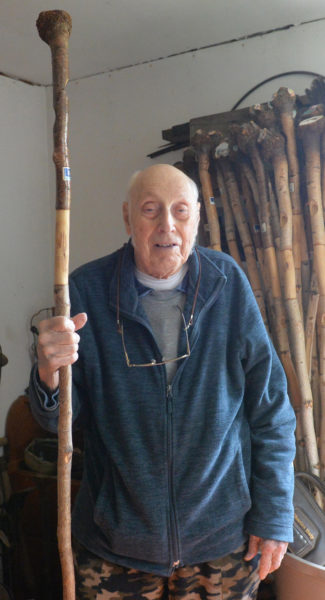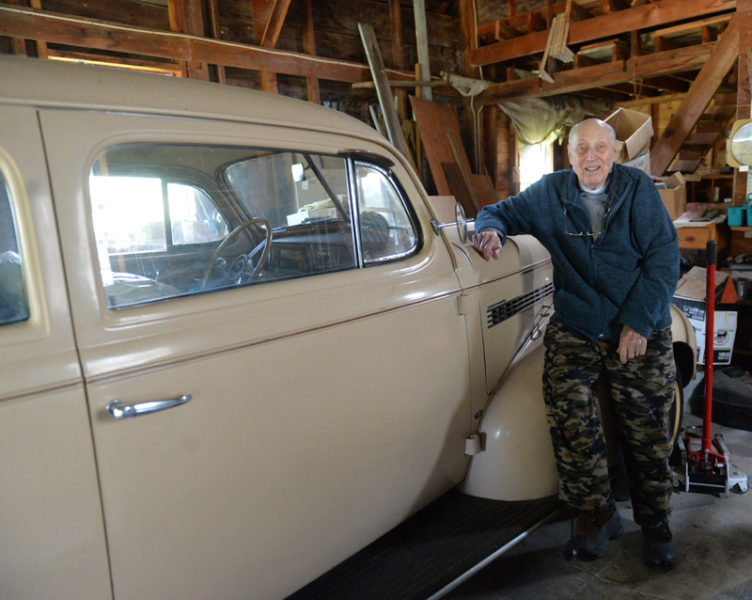
Errol T. Clark with a bucket full of gray birch walking sticks he made. (Paula Roberts photo)
Errol T. Clark, 95, of South Jefferson, was dealt lemons early in his life, and through tough work and the love of his childhood sweetheart, has led a rich life.
Errol was born in Damariscotta in the Round Top farmhouse on Belvedere Road, now known as Coastal Rivers Conservation Trust’s Salt Bay Farm, to Doris (Simmons) and Frank Lailer Clark. His grandparents were Emaline (Erskine) and William H. Clark.
Errol’s grandmother and father both died of pneumonia in the same month when he was young. He left behind a pregnant wife and six children, including Errol. Frank had worked at Round Top Farms for years, so the owner, Edward Freeman, allowed the family to continue to live there after his death. The family got by with Freeman’s help and state aid.
The family moved to Phippsburg, and lived in what Errol recalled was a three-room shack about a mile up into the woods. The family could not afford the tolls on the Bath bridge so they instead would walk across it.
Life in the woods was rough on the family. Errol and his brother, Ted, would go out in the woods and cut 4-inch pine branches with a handsaw to keep warm in the winter. They ate clams, peanut butter, and crackers, whatever they could to get through, but they were often going hungry, Errol said.
“Whatever it was, it wasn’t much,” Errol said. “We were as white as that door.”
A family member reported the children’s dire condition and the seven children became wards of the state. Errol and three siblings went into foster care with Gladys Burk, of South Jefferson. Burk’s neighbor and Errol’s future mother-in-law, Winifred Grady, would say the children were so thin when they arrived, “she could see right through us,” Errol said. Soon though, the children had three meals a day and warm, clean beds to sleep in at night.
At the age of 14, Errol and Ted left state care and went to work on a dairy farm in West Bath owned by Courtney Stover, who later became a senator. When Errol turned 22, he became the foreman of the farm.
In 1950, during the Korean War, Errol was drafted by the Army. Stover requested and received a deferment so Errol could help with the haying. When Errol reported for duty in Bath, the Army had lost his paperwork, so he signed up for the Air Force, driven by a love of airplanes that started in his youth when a WWII plane landed in the fields.
Errol did his basic training at Sampson Air Force Base in Geneva, N.Y. He went in at 140 pounds and came out at 169 pounds and struggled to buckle his pants.
“Eighty percent of the kids cried in their beer most every day. I was having a ball. It was the first vacation I ever had in my life,” Errol said.
Testing showed Errol, who had strong industrial arts training in high school at Bath, was capable of doing everything in the Air Force except flying planes, due to the fact he was color blind.
After basic, he trained as a machinist in Denver, where he learned very early on he did not want to spend the rest of his life standing in one spot working on a machine.
The Air Force needed mechanics, so Errol headed to Sheppard Air Force Base in Wichita Falls, Texas for training in 1953. They made Errol and another man barracks chief in charge of 60 kids.
“He was the enforcer and I was the boss,” Errol said.
After finishing mechanics school, Errol was shipped to Mathias Air Force Base in Sacramento, Calif., where he served from 1953-1955. He ran a crew of four making sure planes were shipshape for flying.
“There were so many planes; we never saw the same plane more than twice,” he said.
He became a ground mechanic and had a ground taxiing license to pilot the planes on the tarmac. He worked on a Conair T-29 Navigator Trainer.
While driving planes on the ground may not sound as exciting as being in the air, there were a few unexpected moments. One time, a plane had checked all its pre-flight checks, only to burst into flames while Errol was moving it.

Errol T. Clark, 95, of South Jefferson, stand with the 1939 Chevy hot rod he purchased at the age of 23. (Paula Roberts photo)
“I was lucky enough to have my boss in the co-pilot seat,” he said. “The flames were shooting out of it. God told me to push the throttle down, which put the flames out.”
While in the service, Errol bought a 1939 Chevy two-door sedan with 98,000 miles on it for $98. His sergeant had a 48 slant back Chevy Fleetline, but totaled it when he got drunk and rolled it. Errol bought the 235 GMC engine, which had just been rebuilt, and with some modification fit it into is ‘39 Chevy.
Errol nicknamed his car “The Sherman Tank,” which he raced on the roads and on the hills in California and in neighboring states against any challenger. The Sherman Tank hit speeds in excess of 100 mph. The car had 200,000 miles on it when Errol left the service after a four-year stint.
Errol and Ted planned on farming together when they got out of the military. Ted got out a year before Errol and they bought a 20-acre farm together in South Jefferson, where they started the first market garden in Jefferson.
They both also got married after their time in the service. Ted married Faith McDonald in 1958 and Errol married Joyce Banks, a woman he had met when they were both children, a year later.
At age 10, Errol met his future wife Joyce Banks while in foster care in South Jefferson, and was immediately smitten by her. He had just gotten punched by a Boynton School bully, when Joyce came up, sat beside to him and kissed his black eye and ran off laughing. They were always friends after that.
At age 17 and still in high school, Joyce married and had three sons, Rodney, Randy and Robert Grady. The marriage failed, so when Errol came home on leave from the service in 1953, he took her out on a date. When he was out of the service and done with school for good, Errol went to Boothbay and collected Joyce and her sons and brought them back to Joyce’s ancestral home (Trask Farm) in South Jefferson.
“When we got married I had a ‘39 Chevy, a shotgun, a rifle, a chair my aunt gave me, and $500, and I still have them all today,” Errol said.
Errol and Joyce had two sons together, Errol A. and Dana, to bring their brood to five boys.
Errol supported his growing family by growing vegetables and strawberries and sold the produce at farmers markets. He grew grain corn for all his neighbors and also raised beef cattle. On the side, he cleaned broiler and replacement hen houses and used the manure to side dress his vegetables. He also plowed snow for the town.
“I was a jack-of-all-trades and master on none,” he said.
He stopped farming in 1978 after a breakeven year.
“I said to myself, ‘I don’t know what God has in store for me now,’” he said.
No sooner had the thought entered his head when neighbor Richard Saltonstall walked into the yard and offered him a caretaker job. Saltonstall died at 46, but his wife Emmy and her son Dickie kept Errol on.
Errol ran Black Fly Furniture out of his carriage house before being offered space in Richard Saltonstall II’s barn. He also repaired furniture, and caned chairs. He made furniture for the Saltonstall’s for 14 years in the winter.
At the age of 72, “they retired me and told me to go home and take care of my wife,” Errol said.
Later in life he kept busy, making custom gray birch walking sticks with inserts for state quarters and birth year pennies.
“I never punched a clock in my whole life, except in the Air Force,” Errol said.
He has been a member of the United Baptist Church for 85 years, and a member of the Grange – first Jefferson and now Willow – for 80 years. He put two new roofs on the Jefferson Grange in his lifetime with the help of other members.
Joyce passed away on Jan. 4, their 46th wedding anniversary. Errol wrote a story and poem about his beloved wife, saying after 46 years of marriage, the most she demanded were three little kisses before she went to sleep and an “I love you.”
“Forty-six years of love and 65 years of friendship. She now sleeps with the angels,” he said.
For the past 20 years Errol has spent countless hours rummaging through 200 years of history of the Trask ancestral farm and researching his own family history. He has assembled dozens of binders of family history and letters and arranged them in chronological order. He also writes stories about his life’s adventures, some sad, but most joyful.
“I love genealogy and history,” Errol said.
At 95, Errol still works around the farm, he lovingly restored in his 45 years there. He has led a rich life, full of adventures, and he cherishes his memories of raising five boys and of a marriage full of love and friendship.
(Do you have a suggestion for a “Characters of the County” subject? Email info@lcnme.com with the subject line “Characters of the County.”)



